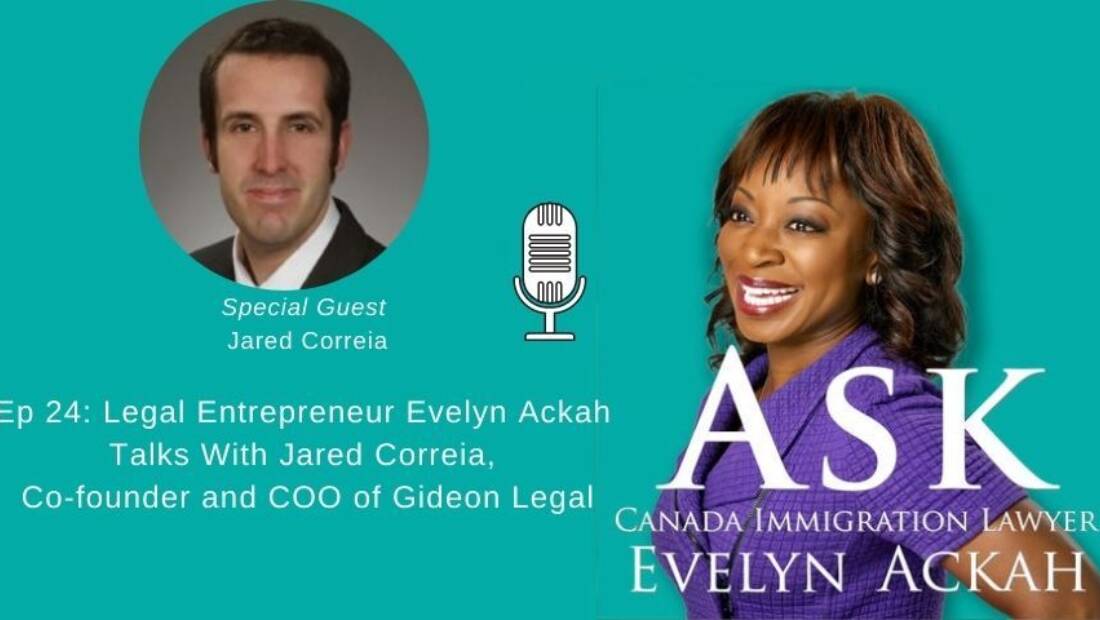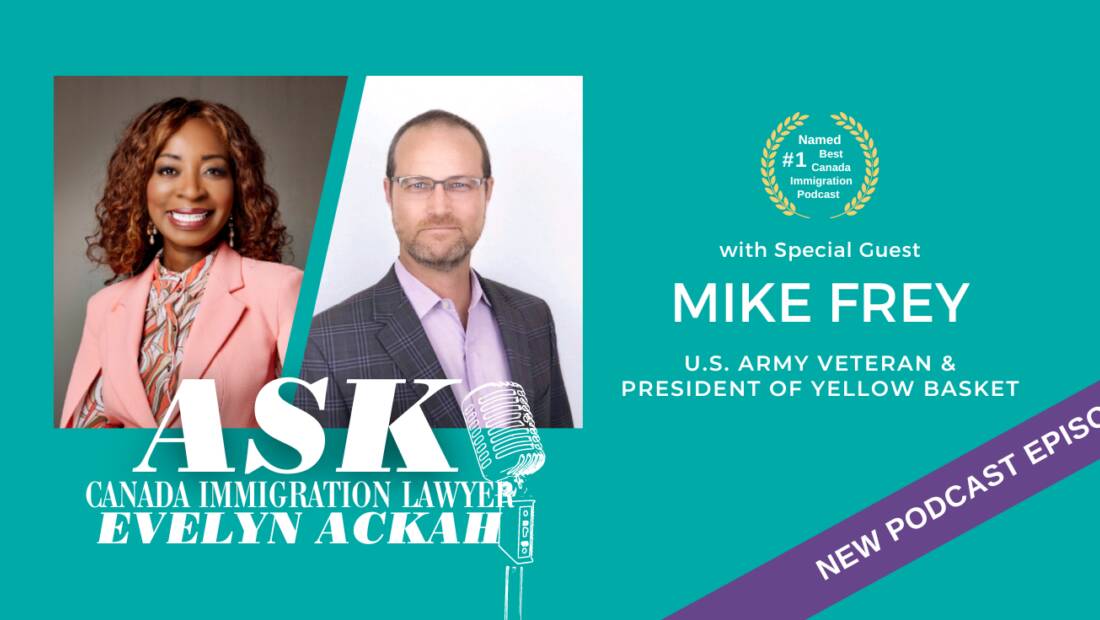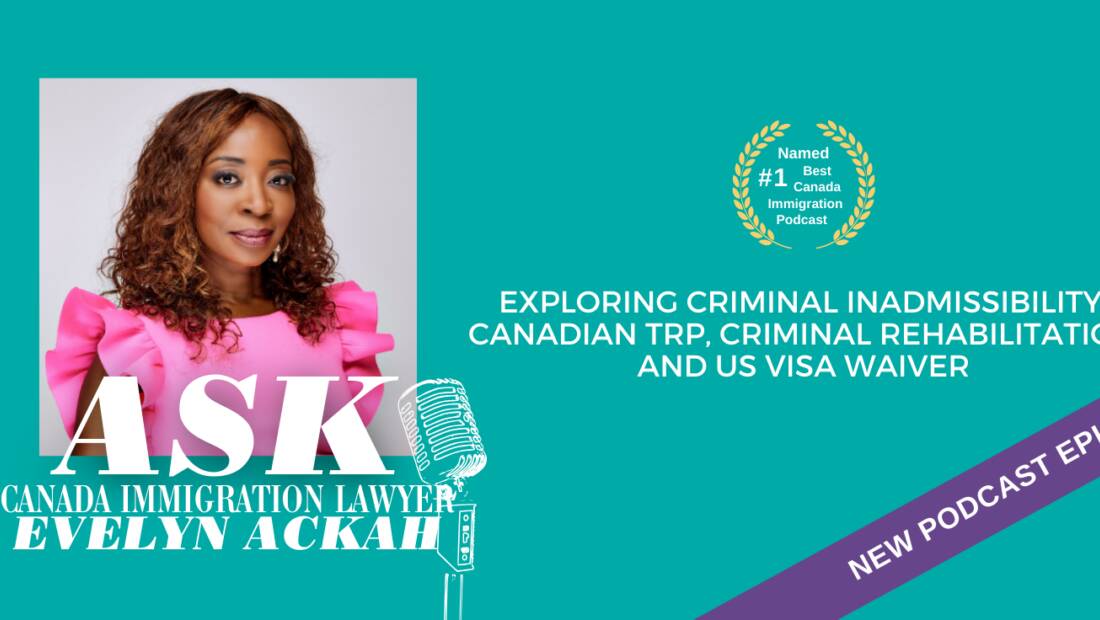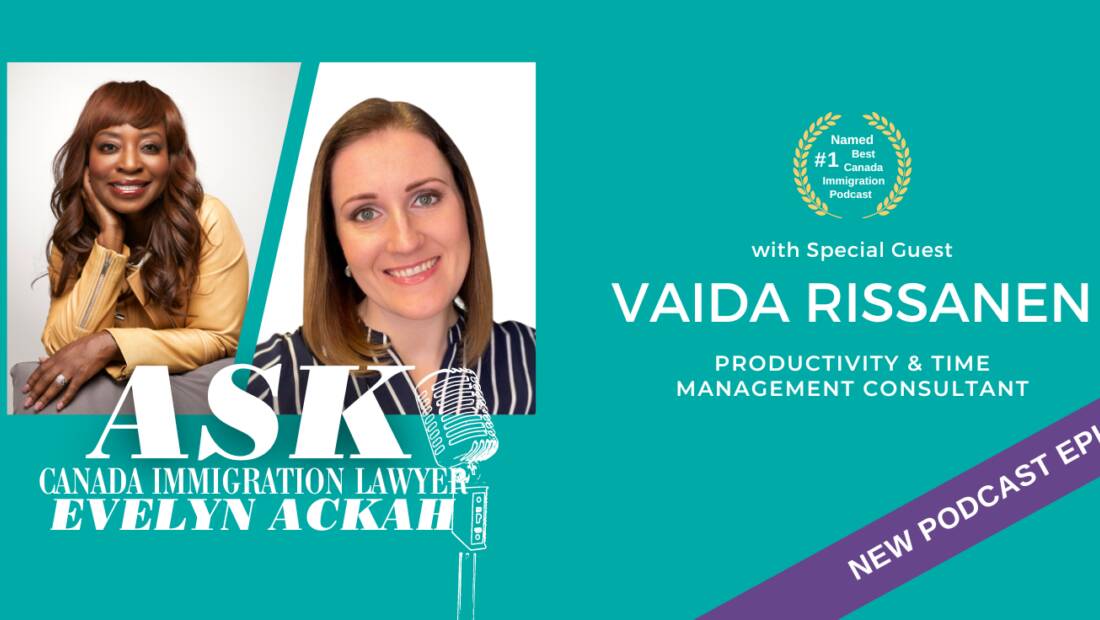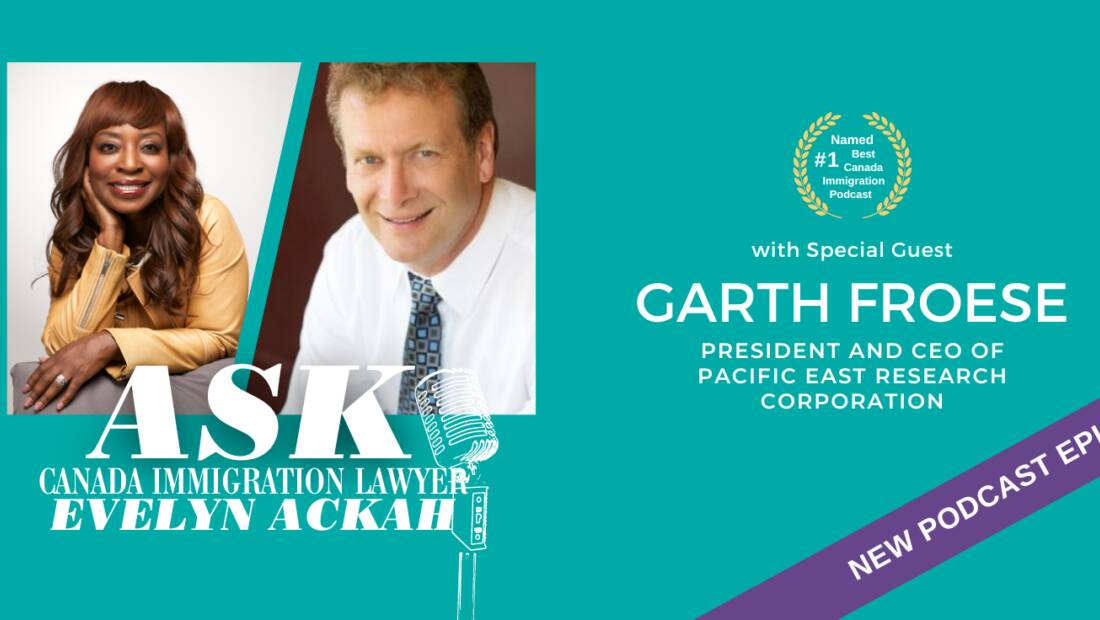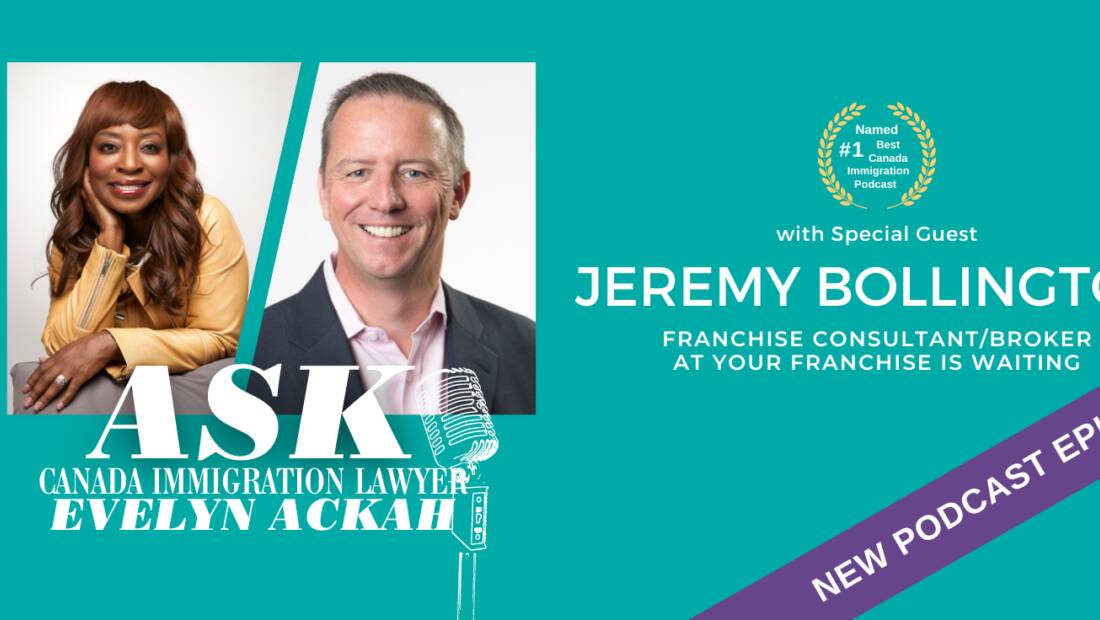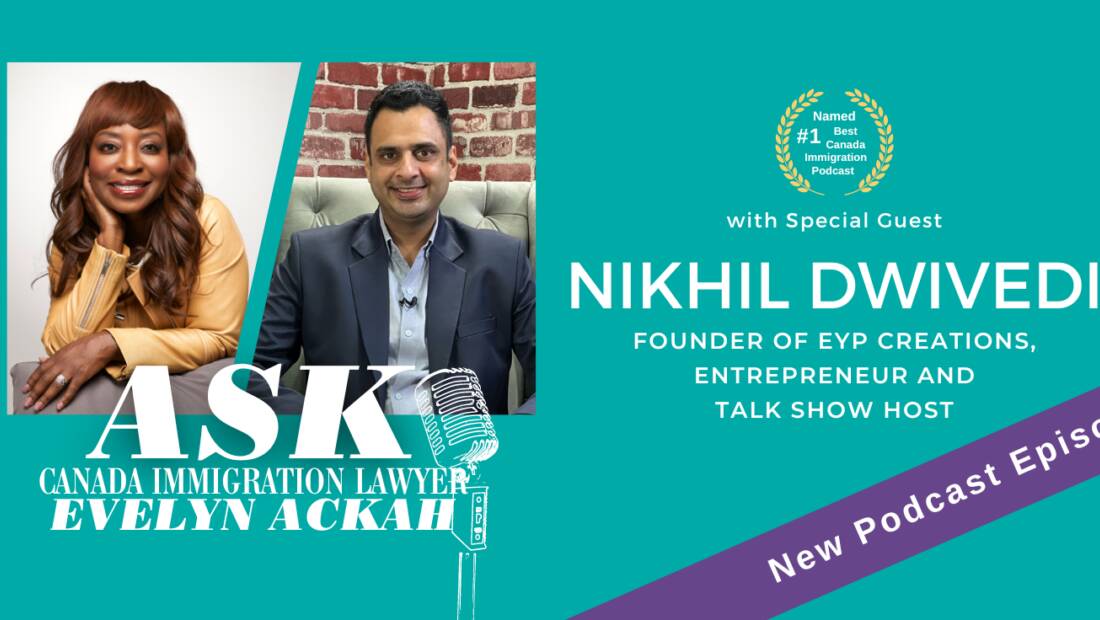Or listen on your favourite podcast app
Business immigration lawyer and legal entrepreneur Evelyn Ackah, host of the Ask Canada Immigration Lawyer Evelyn Ackah podcast, recently spoke to Jared Correia, founder and COO of Gideon Software, Inc., which offers intelligent chatbots, messaging and predictive analytics software built exclusively for law firms. A former practicing attorney in the United States, Jared D. Correia, Esq. is the CEO of Red Cave Law Firm Consulting, which offers subscription-based law firm business management consulting and technology services for solo and small law firms. He is also the host of the Legal Toolkit podcast and speaks frequently at industry events.
Some of the topics we discuss are:
- Helping consumers connect more easily with lawyers
- Legal technology and the consumer experience
- How chatbots benefit legal consumers and law firm owners
- Legal entrepreneurship
- Incorporating technology into your law firm
- How legal technology can help law firm owners grow their business
For more information on immigration to Canada or the United States, or if you have a question about how to grow your law firm, Ask Evelyn Ackah at Ackah Business Immigration today at (403) 452‑9515 or email us directly at contact@ackahlaw.com.

Transcript
Evelyn Ackah:
Good day. This is Evelyn Ackah of the Ask Evelyn Ackah Canadian Immigration Lawyer podcast. It's a very long name, but basically, I'm a Canadian immigration lawyer and I have the pleasure today of introducing and having a great chat with my friend, Jared Correia. He is the co-founder and COO of Gideon Legal and they are one of our fabulous vendors and I thought it would be a wonderful opportunity to introduce him and also talk about his background and learn more about Gideon. So welcome, Jared.
Jared Correia:
Thanks for having me, this is great. The podcast name sounds fantastic to me.
Evelyn Ackah:
It's so long - Ask Canada Immigration Lawyer.
Jared Correia:
I've seen longer.
Evelyn Ackah:
Well, you have a podcast, you have everything.
Jared Correia:
Oh, I've had a five minute podcast for a long time.
Evelyn Ackah:
How do you keep it all together?
Jared Correia:
Little sleep, no, I've always done the content marketing thing. It's been kind of ingrained in how I've marketed myself for years and so I'm a big omni-channel marketing person.
Evelyn Ackah:
Are you still practicing law, Jared?
Jared Correia:
No, I don't practice anymore.
Evelyn Ackah:
Not at all? You just stopped.
Jared Correia:
I stopped in 2005. That was the last time I actually practiced law, so I didn't practice law for too long.
Evelyn Ackah:
And then you become a legal consultant essentially, plus all the other, writer and...
Jared Correia:
Yeah, I mean, I worked for a bar association, the Massachusetts Bar Association for just like a year and a half maybe and then after that I got a gig consulting for the state of Massachusetts. Then I opened up my own consulting business and now I try to get my hands in a lot of places.
Evelyn Ackah:
And it just goes and goes and goes, that's fabulous.
Jared Correia:
Yes, it doesn't slow down as you know.
Evelyn Ackah:
Well, I'm really happy that you're here with us because I got to know you, I'm not even sure how, through some connections with other people and me reaching out or finding you on LinkedIn or something like that because you're everywhere. Every publication I read, A Journey At Law, this that, the other, and I was just like, "Who is this guy?" So I think I said, "Hey."
Evelyn Ackah:
And then we got to know each other because of a lot of shared interest in technology and law from management and technology and leadership. But how has your career developed since you stopped practicing law? What do you mostly spend your time doing?
Jared Correia:
That's a good question, I'm kind of doing a couple of things right now and I feel like I'm always doing business development. I think that's primarily my thing and I'm doing that on several different fronts. Like I said, I'm big into content, big into omni-channel marketing. I write a lot, do a lot of podcasts, do a lot of presentations. I probably do like 150 presentations a year on top of podcasts I guest on and host.
Jared Correia:
So that's my big thing and that drives two things for me. So one is a consulting business that I have. I run a consulting firm where I've got clients who reach out to me directly for subscription consulting services across the world, and then I also have a turnkey consulting operation. So I partner with, I think it's like 13 or 14 bar associations right now, where my company is the exclusive consulting provider.
Jared Correia:
And then I've got a technology company that I founded with a partner called Gideon and that's a website chat tool. And that's going very well. We brought that out of beta a little while ago and we've got about 50 law firms using it right now and we're working on a seed round currently so we can bring that out to a bunch of new law firms. So we're excited about that.
Evelyn Ackah:
Tell me, how did you get into the Gideon thing? Because I met you and your business partner almost near the end of the beta testing when Ackah Law was able to beta test and provide feedback and comments and we thought it was great already and now it just keeps getting better and better. But how did that come about that you just decided I'm going to create this?
Jared Correia:
So, I mean, I've had an interest in technology for quite a while, legal technology in particular. So I knew a bunch of the folks who started legal tech companies in '08, '09 like Jack Newton, Larry Port, Mark Britton. Those guys are all friends of mine and they did really well. And I was still building the consulting business at that point, but I always wanted to try something in that space. And then I met Elan who's my partner at Gideon about three years ago and we started iterating on this idea that we wanted to do website chat, but in a different way.
Jared Correia:
So we created, we'd said, "Let's do chatbots. Let's do fixed fees for users so it's not as costly for law firms to get into and let's make that engagement and intake process for law firms a whole lot easier than it is right now." I mean, there's some staggering numbers out there. 65% of law firms voicemails don't get responded to.
Evelyn Ackah:
It drives me crazy.
Jared Correia:
It takes an average of eight emails to schedule an appointment with an attorney. So we built this chat tool that classifies leads and that has a complete scheduling tool built into it and we've got document automation and text features in beta right now and that should be coming out soon as well. So we're moving down the line of more interaction management.
Jared Correia:
But it's been really exciting to develop a product and add users. It's been a really cool experience and I've mostly seen that from the outside and not seeing it from the inside is a wholly different animal.
Evelyn Ackah:
Yeah, it's a lot of work, isn't it?
Jared Correia:
Yes, everything's a lot of work. That's the trick.
Evelyn Ackah:
Everything is but it takes a lot of work to create a whole new program and a whole new app.
Jared Correia:
Yeah, we built it from scratch. It was proprietary.
Evelyn Ackah:
That's fabulous. My God. Well, I remember when you asked us if we would want to beta test and I said, "Sure," because we like many law firms that had experiences with lead generation or chatbots that they call leads and everything was the lead and they're charging thousands of dollars a month for nothing. So I was very... I was a little apprehensive at first because I was like, "Oh no, it's another one of those." But right away, we could see that the plan was it's supposed to make life easier for lawyers and law firm owners. It's not about adding to the volume of work. It's thinking like the client, but also not needing tons and tons and tons of work.
Evelyn Ackah:
So I mean, I like it because it's simple and it's focused on the client experience, whether you're the law firm owner or the client that's connecting. And I like that it's flat fee because it just means that whatever happens happens, it's not this sense of one month there's $0 paid and next month is $3,000 paid and we don't actually have a file for that. I mean, we've been in that situation early days when we started with chatbots. Useless, this is not a chatbot. For me, it just feels like a part of the intake process and it's like a natural flow into that onboarding experience for the client.
Jared Correia:
That's great. That was totally our intention. I think if you look at everywhere else in legal, like it's all about flattened costs, predictable expenses. You know as a law firm owner, it's really hard when you've got an expense that comes up and it's like, "Oh boy, I owe an extra three grand this month which I wasn't expecting." So yeah, we tried to make it intuitive for both sides and easy to use. So there's tools out there that are legal consumer-facing but don't involve attorneys and we wanted to create a viable tool that still included attorneys. That was easy for attorneys to use, easy to manage, easy to update with a no-code environment and then also really simple and intuitive for legal consumers.
Jared Correia:
And that was our biggest thing because if you look at the way that legal consumers and lawyers interact, lawyers have very little understanding of what legal consumers want and I think you're one of those lawyers who has a good understanding of it, but there are very few.
Evelyn Ackah:
I'm constantly learning.
Jared Correia:
Yeah, but there are very few lawyers who even think about that. Lawyers are mostly like, "Hey, this is what our marketing strategy is. This is what consumers are going to do because that's what we tell them to do." But consumers don't react well to that. So having a better understanding of how consumers reach out to legal services and law firms, what they need to know, what they should know, we try to make that really simple. Get the information to the clients, triage them quickly, make sure it's a viable relationship for both sides and then just connect the two.
Evelyn Ackah:
That's great. No, we're really liking it. What is the feedback you're getting? So you've got about 50 plus law firms right now and you're just slowly rolling out so I can see that there's going to be a plan to get bigger and bigger, but are you getting feedback from people? Are they happy? What kind of sense... ?
Jared Correia:
Yeah, feedback's been really good so far, people seem to like it. They like some of the aspects that you talked about, easy to use, relatively inexpensive compared to other tools. And I think the people like two other things as well, one is that it's a legal-specific tool. If you're not buying something off the shelf and you don't get to talk to a lawyer. As you mentioned, I was a practicing lawyer, so I know how this works. We're building software that's suited for lawyers. So we've got things in there, like click-through disclaimers built-in, which you wouldn't automatically get from other providers.
Jared Correia:
And then I think people like the fact that we continue to innovate, right? So we went down the road of building out this document automation platform in a chat service because we feel like it's viable for law firms that are going to productize. We feel like it's viable for law firms that want to start using document assembly software and getting more efficient. I mean, what better way to capture information from documents than doing it via a chat tool that consumers are already comfortable with, it saves you so much time on the backend. So I think the feedback has been really positive. Pricing, innovation features, people like all of that.
Evelyn Ackah:
And the integrations that you have right now, how is that developing?
Jared Correia:
So we're hitting bigger companies first, of course, so the most usership is guiding how we're building integration. So we've got integrations on the calendaring side because we do the calendar and appointments stuff automatically. So we're linked to Google calendar, we're linked to Outlook calendar. And then we've got integrations for both Clio Manage and Clio Grow, which is interesting because Clio Grow doesn't yet have an API, but-
Evelyn Ackah:
I know, everybody knows that. It's driving us crazy.
Jared Correia:
I'm sorry, I shouldn't have brought that up. But not a ton of companies are linked with Clio Grow, so we're able to push into their lead inbox, which is about the most we can do at this point. And then we just recently launched an integration with Olidify, which is another case management software that's also got a CRM front to it. It's built on Salesforce. They have a lot of large personal injury firms as clients so that's a good market for us. So that's the second case management integration we just rolled out. We'll do more moving forward but that's one where we came out with a few weeks ago.
Evelyn Ackah:
So have you been looking at the types of practice areas to drive what you're, it's interesting because as opposed to just saying law firms, are you saying, "Okay. Personal injury, family law," are you thinking, "What do they need so we can get them to buy in." I mean, immigration law, Canadian and US, is not exactly probably what you were thinking when you started, but the fact that it works for everybody.
Jared Correia:
Well, we tried to make it viable for any consumer-facing law practice. So in any law practice it's B to C it's going to work for. And so what we've been doing on the backend is building scripts. So the biggest part or one of the biggest challenges of utilizing chatbots as a law firm. There's going to be some kind of script that people have got to walk through, and you go to a lot of law firms and they're like, "I don't want to build that." Fair, right? Because lawyers are busy.
Jared Correia:
So we built out a lot of template scripts for law firms based on those major practice areas. So if you've got a family law firm, we can say, "Hey, we'll just build this for you. We've got it ready to go. You're going to get an account. It's got a preloaded script, a basic one and one for your practice and then you're ready to roll." And some people get wild with it, like we have an attorney in Chicago who's built 275 chatbots for his website. He's got one on every page of his site. He might need a hobby, but we love him.
Evelyn Ackah:
Seriously, that is incredible. But do you think that having a bot, I mean, this is one thing that we're dealing with as we deal with our PPC and social media is, does it slow down your site if you have one on every single page, because obviously I'd do it if I thought it was useful. But we don't have it on all of our pages because that's been one of my concerns or the feedback we get sometimes.
Jared Correia:
No, I totally get it. And so, because the bot, the way we do it is an embed code, and that's the way most bots work. It's going to slow down the site a little bit. There's no getting around it but we do some things to avoid it being really, really a problem. So one thing we can do is we can roll out the bot last, for example, and that's how we default it. So everything else is going to load in the website first and then the bot loads last. So that's not going to reduce your speed too much, that's compliant with accelerated mobile pages and as we both know, speed of load is a tool within search rankings. So you want to be fast when you load.
Jared Correia:
So that's one of the things that we've developed over the course of time, because we did get that feedback from people originally. It was slowing down the site so we loaded it last, that seems to have solved the problem. And then we have the ability to work with law firms so if it does appear to be slowing down on the site or a particular page, we'll work with them to combat that. But generally speaking, loading it last has solved a lot of those issues for us.
Evelyn Ackah:
Yeah, I haven't seen any issues, but our website provider or whatever, they just mentioned that these are things to speed up. It's already good enough, fast enough. But I was like, "Well, we're not getting rid of our Gideon. So you figure out some other way around this because it's really helpful." We're 24 hours by the fact that somebody can access us and have some engagement and capture even when the office is closed. So that's the plan.
Jared Correia:
And I think you make a really good point there. So part of this is just like a weighing mechanism, right? Site speed's important but engagement is also important. So if somebody lands on your website, even if that website lands super quickly, consumers want to know two things. They want to know about the legal process and they want to be able to take a next step. So what we try to do is provide them some scripted conversation so they get some information and then they can take the next step if they qualify by scheduling an appointment.
Jared Correia:
And so utilizing a chat, for example, that does mean you don't have to load another program onto your site. For example, you don't have to use Calendly or Acuity or anything like that. So I think it is a trade-off.
Evelyn Ackah:
Yeah, I do too.
Jared Correia:
Any bot is going to slow down your site, but then you get more engagement and if you weigh it out, both those things are valuable. It's just a matter of how valuable are they to your firm.
Evelyn Ackah:
Yeah, it's a very passive way of capturing those people and creating engagement when you're closed. Off hours, when you're away, whatever, and you hopefully don't lose them because our plan, our process is the client engagement coordinator, the next day is on it, dealing with it if it's overnight or weekends and engaging them further and we work with Clio Grow and it's working fine, really well. So we're really happy with it.
Jared Correia:
Yeah, and your fast as well at your firm and that's part of the key too. Getting that response in place quickly and you're right, legal consumers want speed of response from attorneys. So even if it's a Saturday, they want something and if you don't want to be working on a Saturday, you need to have a replacement for you. They need to converse with something, even if they're not conversing with some person.
Evelyn Ackah:
Absolutely. I think it's great. We love it. I think it's wonderful. I want to know more, I guess, how are you sharing all your updates? Are you sending out blogs or newsletters or anything? Because for me, I'm just hearing some of this new stuff now and I'm like, "I didn't know you were doing this."
Jared Correia:
So now that we're out of beta, we're going to launch a regular newsletter to our users and we'll probably ramp that up in the next month or so. So probably in the New Year, we'll start doing that and then we'll get a cadence going, probably monthly. But we've been head down on development into this year and as I said, we're working on a seed round now, so hopefully once we close that, we'll be able to do a lot more stuff in terms of marketing and development that we've got on the radar.
Evelyn Ackah:
How exciting.
Jared Correia:
And then the updates will be forthcoming. In a few months, you might be sick of updates.
Evelyn Ackah:
No, I don't think so. What I keep hearing, I love when programs develop. When there's more and more and more as opposed to this is all I can ever do for you. That's okay. But it's always great to see what else are they doing and to be a part of that. And as I said, here in Canada, apparently we're one of the more technical law firms, but I think that if people, small law firms, knew that this was available and it's not prohibitive and it's accessible, it's worth it. And so, I mean, I'm a part of all these small law firm, women law firm owners, groups, all this stuff. There are a lot of Canadian ones and they're solo, true, true solos with nobody else.
Evelyn Ackah:
To me, this is the very low hanging fruit technology that they need and so I'll make sure that we'll circulate this on those lists because people ask all the time, "How are you growing your business?" And I'm like, "You got to invest in technology. Even if you don't have people, affordable technology can make a big difference for your practice."
Jared Correia:
Yeah. I mean, you're totally right. Accessible technology and using it to manage these rote processes, two things can happen. One is that you don't have to hire as many people in the first place. And then, a lot of attorneys say, "I don't want to fire my staff." Well, you don't have to, your staff are now doing different things. Maybe they're managing that technology. Maybe they're becoming salespeople. You're up-skilling them while you're using technology to do the stuff that they don't need to do anymore.
Evelyn Ackah:
Exactly. That's what we're talking about now for us, as I was mentioning before we started, we have a number of VAs now that are offshore and the reason is they're helping us with rote, repeat, standard stuff that's not client-based work. That's not physical work. That's not legal work. Admin, very much admin and helping us with special projects. And that allows those people to do the highest quality, highest value work. And to me, that's what this is about is how you're using your technology, right?
Evelyn Ackah:
One of the things we've done, I think with Gideon is... So you guys have it now, feeds into Clio Grow, at least some of it. We've even got a Zapier set up and now it's even more fine-tuned because there is no API. So we decided we're going to play around with this so that all the information just fully goes into where we need it. So it's getting there, but I love that your technology is possible for us to do that, right?
Jared Correia:
Yeah, I really appreciate that and that's a cool use case. That's one of the best things about building out software is that you build it out in this sterile setting and it's just like a group of people, and then you think of maybe 10 use cases for it. And then you throw it out into the wild and all of a sudden there's 75. And I talk with attorneys all the time where I'm like, "That's a great way to use technology that I never would have thought of."
Evelyn Ackah:
Yeah, we always find a workaround to get the job done. But no, I really am excited for you. I think 20 21 will be a really exciting year for Gideon.
Jared Correia:
Yeah. So let's hope 2021 is an exciting year for everyone. Can't be worse, right?
Evelyn Ackah:
I can't wait for the New Year.
Jared Correia:
We're almost there.
Evelyn Ackah:
We're hanging on. But no, I do think that Gideon has been a part of, I mean, this tough year, we've been able to basically maintain our numbers, which is incredible.
Jared Correia:
That's fantastic, good for you.
Evelyn Ackah:
The team and the technology and Gideon and all of our team of technology providers have really helped us plus our fabulous staff. But it's been crazy. It's like you work harder, but just to look at the numbers and realize we're basically the same as last year. Sure, we would've loved to have grown more, but to be in the same place is a really good testament and I think technology like Gideon has really helped us. So I'm very grateful to you and your partner for letting us beta test because we got you guys on as soon as we could. We're stuck with you and you're stuck with us and we're going to make sure that we continue to tailor it because I think there's probably more things we could be doing that we haven't yet done since you're making all these new changes in addition.
Jared Correia:
Right. Absolutely. No, I think that's great and congratulations to you for sticking the landing in 2020.
Evelyn Ackah:
What a year but thank you so much for all your support, again, and I really appreciate your time on our podcast. People will find out where to find you. We'll have the links included and anybody who wants to talk to me about Gideon, feel free to contact me at ackahlaw.com. But I am a big, big cheerleader for the technology. Thank you so much.
Jared Correia:
Thank you. You're amazing. I appreciate it.
Evelyn Ackah:
We appreciate you. Take care.
Jared Correia:
Have a good day.
Evelyn Ackah:
Okay. You too.

